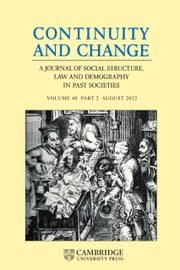Article contents
Headship and succession in early modern Kyoto: the role of women
Published online by Cambridge University Press: 07 July 2004
Abstract
This study examines the role of women in headship and succession in early modern Kyoto using the population registers of two Kyoto neighbourhoods of differing economic status and the private documents of a family business. The private documents allow an examination of the processes and reasons behind inheritance decisions. I find that women could inherit when sons were absent, incapable or unwilling, and heiresses were used to recruit capable outsiders into the bloodline. More than these roles, women played an active part in making and carrying out inheritance decisions even when the heir was male, as well as providing alternatives to the usual succession rules.
- Type
- Research Article
- Information
- Copyright
- 2004 Cambridge University Press
- 4
- Cited by


